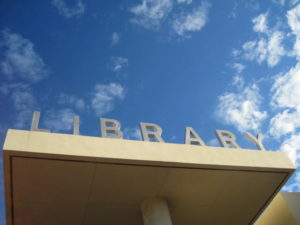 A few weeks ago, I continued the nostalgia tour of my South Florida childhood with my cousin Kathleen. Kathleen is a few years older than I and lives near the small, suburban island where we both grew up. After plundering our former neighborhood, Kathleen and I knocked on the door of the lakefront, two-story house where our grandparents used to live. No answer, so we snuck into the backyard and posed for pictures by the swimming pool, re-enacting the mischief we used to share as young girls.
A few weeks ago, I continued the nostalgia tour of my South Florida childhood with my cousin Kathleen. Kathleen is a few years older than I and lives near the small, suburban island where we both grew up. After plundering our former neighborhood, Kathleen and I knocked on the door of the lakefront, two-story house where our grandparents used to live. No answer, so we snuck into the backyard and posed for pictures by the swimming pool, re-enacting the mischief we used to share as young girls.
We then motored to the mainland to circumnavigate St. Francis of Assisi, our first school, and the church beside it where we attended Sunday Mass. After I said goodbye to Kathleen, I drove through the town again on my own. I surprised myself with a gusting impulse to turn onto a side street. I was under the spell of a siren’s call. Halfway down the block there it was: the library, a place that I had not thought of or seen since I was a child. It seemed to me in that moment that the library had beckoned me, urging me to be near it once again and to consider its place in the pantheon of my young life.
I parse my childhood into two distinct worlds. The most potent and beloved was the outdoor world because it belonged solely to us kids. My brothers and sister and I spent our afternoons and weekends outside, roaming and exploring, building tree forts in the empty lots across the street, playing Kick the Can, parading the neighborhood on our Stingray bikes. The outdoor world was ripe and unregulated. It gave me adventure and discovery. We were a government of kids, making our own rules, venturing where we wanted and drawing maps of the world through our senses.
And there was my inside world. My home, my grandparents’ house, the school, the church—these structures were the built city of my childhood. Inside their walls, there were rules and expectations. The inside world was regulated by grown-ups. That world gave me order and safety; it taught me discipline and responsibility. But the inside world wasn’t mine. I had no power there, no say.
As I sat in the car outside the library, I remembered how a couple of afternoons a week, I opted out of our neighborhood car pool ride home and chose to walk. On those days, I stopped by the library. Though it was a building in the realm of the grown-up world, in the library I was a child learning to make her way alone. There were rules, but I was free to make decisions entirely on my own. I could be by myself in a room full of strangers, choose the books I wanted, savor the smell of the paper and ink, and participate in the worshipful silence. My childhood was noisy; the library was quiet. In the library I could exhale and drift. It gave me sanctuary and the incomparable company of books.
I’ve spent this summer in Miami Beach, my former home for more than two decades. The Wi-Fi signal in my apartment is anemic, but I’ve resisted making the service call to get it fixed. Instead, I take my laptop to the library. It’s three blocks away, and the walk takes me over a footbridge arcing over a canal. At the library, I push through the heavy double doors and park at a long table encircled with purposeful chairs. I take my place among the books, the smell of ink and paper, the enfolding temple. I feel myself among the others, but I am also in my cocoon, straddling my outside and inside worlds. The adult in me is soothed. And the child inside is reawakened.
Laura Kelly can breathe underwater, smell in Technicolor and see with her toenails. She once made a pair of pants out of cornflakes. She says that she and one of her mother’s sisters invented the tango, the shoelace and six letters of the alphabet. In her spare time she fancies languages light on vowels and origami. She’s also been a Flag resident for 12 years, worked in the trenches for the arts and is currently on a walkabout gathering inspiration to infuse into this city once she returns.

